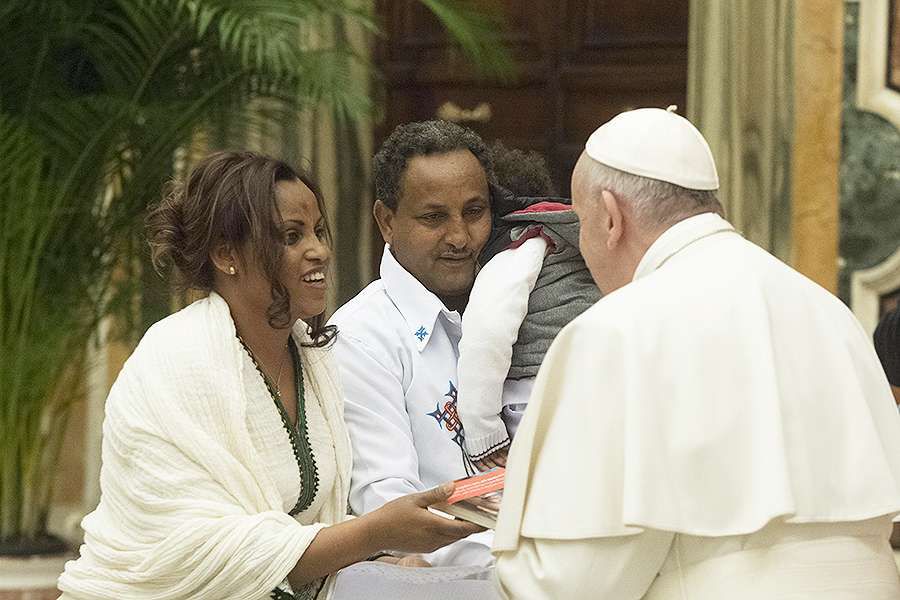Speaking at a meeting of European bishops on Friday, Pope Francis said that the mass arrival of migrants and refugees may have its challenges, but also gives us the opportunity to be missionaries — even without leaving home.
“Contemporary migratory flows constitute a new missionary ‘frontier,’ a privileged opportunity to announce Jesus Christ and his Gospel without moving from our own environment,” the Pope said Sept. 22. In personal encounters with refugees and migrants, especially those from different faiths, we can “concretely bear witness to the Christian faith,” finding a “fertile ground for the development of a genuine and enriching ecumenical and interreligious dialogue.”
Pope Francis spoke about immigration in an audience with national directors of pastoral care for migrants. They were participating in a meeting organized by the Council of European Episcopal Conferences (CCEE) in Rome Sept. 21-23.
The Pope also said that the arrival of Christian, and particularly Catholic, migrants is an opportunity for the Church in Europe to more fully realize its catholicity, its universality, which is part of the Creed we confess every Sunday at Mass. “In recent years, many particular Churches in Europe have been enriched by the presence of Catholic migrants who have brought their devotions and their liturgical and apostolic enthusiasm,” he said.
Faced with the massive and complex migration flows of the last several years, and the crisis it has presented for current migration policies, the Church intends simply to remain faithful to her mission: “to love Jesus Christ, to adore and love him, particularly in the poorest and most abandoned,” the Pope said. The Church’s love towards her brothers and sisters from other countries is a maternal love which “demands to be manifested concretely at all stages of the migratory experience, from departure to journey, from arrival to return…”
And the hope is that each local Church can contribute to this in its own way according to its own abilities. “Recognizing and serving the Lord in these members of his ‘journeying people’ is a responsibility that unites all particular Churches in the profusion of a constant, coordinated and effective effort,” he stated. In his experience listening to the local Churches in Europe, the Pope said that he senses a “profound discomfort” about the arrival of so many migrants and refugees.
He said he believes this discomfort must be acknowledged, and that it can be understood in light of recent economic crises faced by some countries. It may also be “exacerbated” by the scope of migratory flows, the unpreparedness of host countries, and inadequate national and community policies, he said.
But it also points us to the difficulty still faced in a concrete application of the universality of human rights; for Christians, the logic that the human person should be at the center of all our decisions, as a unique and unrepeatable creation by God. Francis continued, saying that he would not hide the concern he feels at signs of intolerance, discrimination and xenophobia found in different regions of Europe, which he believes to be motivated by fear and distrust of “the other, the stranger.”
He said he is also worried when Catholic communities turn migrants away under the justification of preserving the original culture and religious identity. “The Church has spread to all continents through the ‘migration’ of missionaries who were convinced of the universality of the message of salvation of Jesus Christ, intended for men and women of all cultures,” he said. “In the history of the Church there has been no lack of temptations of exclusivity and the raising of cultural barriers, but the Holy Spirit has always helped us to overcome them, guaranteeing a constant openness to the other, considered as a concrete possibility of growth and enrichment.”

